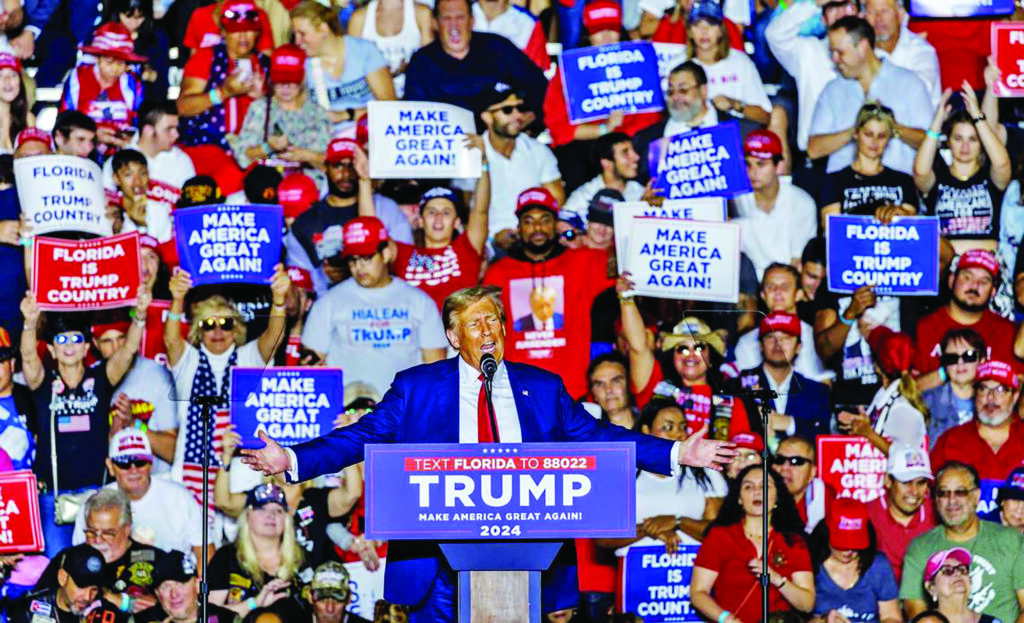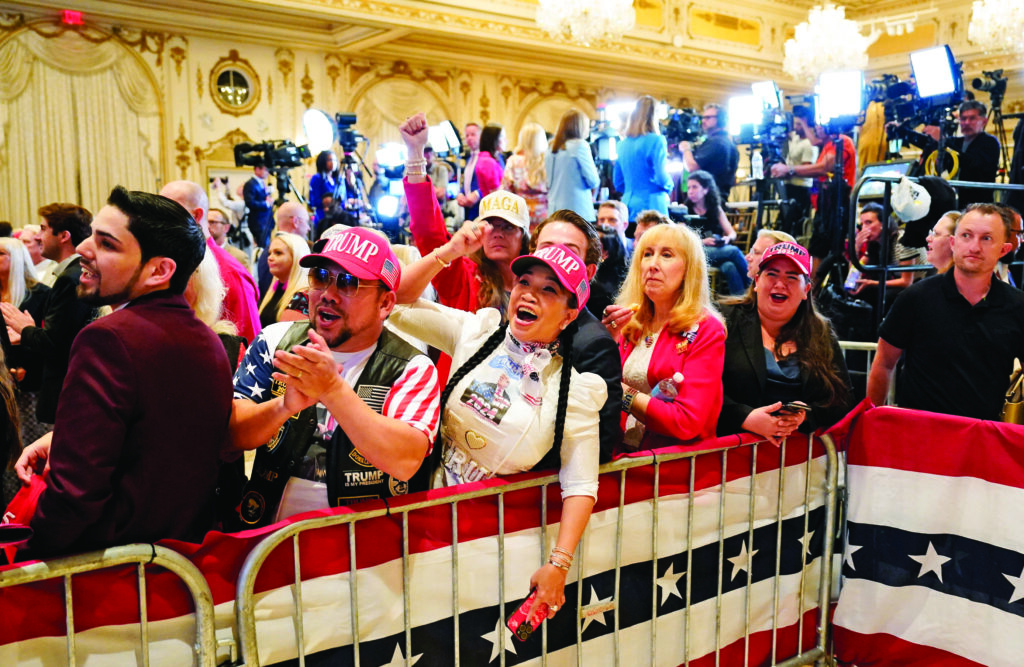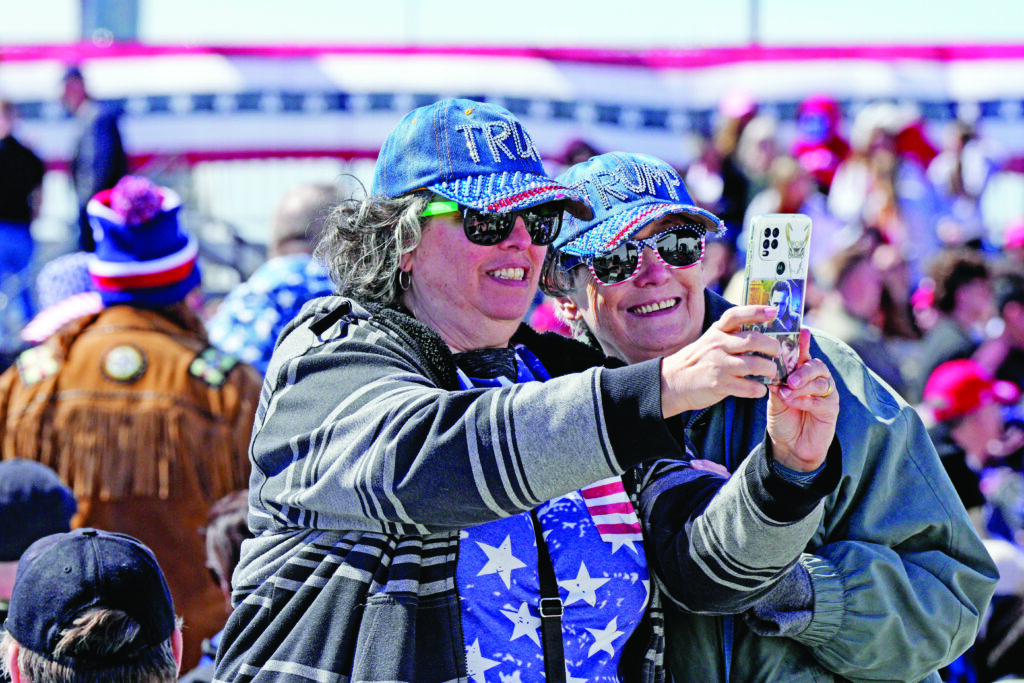
PALM BEACH, Florida — On March 15, the Republican Party of Palm Beach County held its Lincoln Day Gala at Mar-a-Lago, where its special guest was also its host, Mar-a-Lago owner and former President Donald Trump. Around 8:30 p.m., Trump interrupted his private dinner on the outdoor terrace (a dinner with one aide and me, for a mostly on-the-record conversation), to make a brief speech to the Republican group gathered in another building in the complex.
Trump walked to the podium to his usual entrance music, Lee Greenwood‘s “God Bless the U.S.A.” To say the reception was wildly enthusiastic would be an understatement. The hometown Mar-a-Lago crowd’s reaction to Trump was more than just political enthusiasm: more intense, more personal, more devoted.

Trump had a sheet of prepared notes — whom to recognize, whom to thank — but spoke mostly off the cuff. At the end of his remarks, Trump walked along a rope line on his way out of the room. He shook hand after hand, but rather than a simple handshake, some excited admirers would grasp his hand so heartily, and squeeze so hard, that Trump had to pull back to move on to the next person. Near the end of the line, one woman seized Trump’s hand so vigorously that a Secret Service agent had to deliver a sort of mini karate chop — nothing violent, just a firm tap — to break up the one-sided embrace.
As we walked back to the terrace to resume dinner, I asked Trump, “Weren’t you once famously a germaphobe?”
ELECTION 2024: FOLLOW LATEST COVERAGE
“In this business, you just have to get over it,” he said. He held out his right hand and showed that the back was covered by a large, greenish bruise. There were also marks left by female admirers with carefully manicured nails. It happened all the time, he said.
As we walked, Trump marveled at the emotional connection people in the crowd felt with him. He feels it, too, and knows it is unusual, not the sort of thing one sees every day in politics or in life. He also knows it is the foundation of his comeback, from a presidency that ended in disaster in 2021 to the 2024 nomination of the Republican Party. “It’s a great honor,” Trump said, which is something he says often to tell the listener he appreciates the importance of something, even handshakes that leave him bruised.
Before we went to the Republican event, I asked Trump about the comeback. On Jan. 20, 2021, he returned to Mar-a-Lago an ex-president, still awaiting an impeachment trial in the Senate (his second), with his own party, and all of Washington, reeling from the events of Jan. 6. How could a politician ever recover from that? At that moment in 2021, did Trump think he was finished politically?

“No, I never really felt that,” Trump said. “Because I feel a love from the people. I feel the crowd, and I feel a love. I never felt that — just never felt it.”
“Did you think you could run for president again?”
“I thought so,” Trump said, “because I thought I was very popular. I knew I won the election.”
Trump’s son Eric and his wife, Lara Trump, newly installed as co-chairwoman of the Republican National Committee, were sitting at a table near the former president’s. At one point, the conversation included them, and Lara Trump said she remembered a family dinner at Mar-a-Lago the night after Trump came back from Washington, his presidential term over. As Lara Trump recalled, her father-in-law said, “I know I can do this again.” A comeback was clearly on his mind, even in his earliest post-presidential hours. Trump laughed at the memory and said Lara had told the story more clearly in one sentence than he had in several minutes of conversation.
The recollection spurred Trump to think more about his feelings in early 2021. “I felt that — I know that I won the election, by a lot,” Trump said. “If I felt I lost the election, I would not have done this. You understand that? I hope that makes sense. If I felt I had lost the election, I would not have done this. But I knew I won the election by a lot. I have no doubt. And by the way, neither does 78% of the people, when you take a look. And you can’t have that, where a large majority of people in a country think that the elections are rigged and stolen. And you can’t have open borders, either. You can’t have certain things.”
Trump had almost changed the subject on himself, but he moved back on track. “I would say that I started in my mind campaigning the day after I lost the election,” he said. “That didn’t mean I’m out there campaigning per se. But we had tremendous love, tremendous spirit from the day — that was not interrupted by Jan. 6. Jan. 6 was a protest against a rigged election. That’s what Jan. 6 was. It was nothing else. It was a protest against a rigged election. And the ones that they should go after are the people that rigged the election, not the people that were protesting.”
It was an extraordinary statement. In the first portion of Trump’s thought, he said repeatedly that he won the election. And in the second, he said that he lost the election. What does that mean? I can’t read Trump’s mind, but I have listened to him carefully for several years, and my view is that 1) he really believes that he won the 2020 election only to have scheming Democrats steal it from him, and 2) he knows that he is not now president of the United States. He’s not the commander in chief. He doesn’t sign bills into law. So in the sense of whether or not the election was fair, Trump maintains he won. And in the sense of who is now the president, Trump obviously is not.

As Trump talked, he was alternately recommending items on the menu, operating the iPad on which he personally picks the music on the terrace’s sound system, and telling the stories of some of the business and sports figures present for dinner that night. At various tables, the crowd included hockey legend Wayne Gretzky and billionaires Ike Perlmutter and Nelson Peltz, who are involved in a high-stakes showdown with the Walt Disney Company over its management and strategy. (Trump offered a quick synopsis of the fight: “They don’t like woke.”)
Passersby, members of Mar-a-Lago, also stopped at Trump’s table, which was roped off from the rest but still very accessible. All professed admiration for Trump. One man expressed a common sentiment when he told Trump he was “the best president we’ve ever had.”
When the man left, Trump said he always had fans, but something has changed in recent years. “Everyone’s in love with me now,” he said. “You know why? Because he’s so bad. He’s so bad.” It required no explanation to know that “he” referred to President Joe Biden. “He’s such a bad president,” Trump continued. “They hate the lawfare that’s being done. I don’t ever like to say, because it’s never happened before, but I think it’s raised me 25%.”
The lawfare Trump referred to, of course, includes two federal indictments from the special counsel picked by Biden’s Justice Department, an indictment from an elected Democratic prosecutor in Georgia, another indictment from an elected Democratic prosecutor in Manhattan, plus a terribly damaging financial lawsuit filed by the elected Democratic attorney general of New York.
I mentioned that Gov. Ron DeSantis (R-FL), until February Trump’s opponent in the Republican primaries, said Trump’s indictments “sucked out all the oxygen” from the GOP race. Did Trump have any idea that being indicted, not one, not two, not three, but four times, would raise his standing in the race and lower his opponents?
“Who would have thought that, right?” Trump said.
“Did you think?”
“Well, usually when that happens, you announce you’re leaving, you’ll fight for your name, and you’re going back to your family, right? I would say usually — 100% of the time.”
“Why didn’t you do that?”
“One thing — the public knows me really well, and I’m able to explain how phony all this stuff is,” Trump said. He doesn’t attribute all of his increased poll ratings to what many Republicans now call the “weaponization” of the justice system. But he knows it played an important role.
“It’s been very strong from the beginning, but it’s grown nevertheless,” Trump said of his support. “And part of the reason, not the biggest part of the reason but part of the reason, has been the weaponization of the Justice Department. It’s been a big part of it. And we’re doing just fine on that stuff because it’s all bulls***. It’s been a total weaponization. They raided this house.” Trump’s voice made clear he is still astonished by that, a reference to the Aug. 8, 2022, FBI search warrant raid on Mar-a-Lago.
Trump is a crowd reader. He is always obsessed with ratings and polls, but he’s constantly looking for personal feedback, too. What is the audience’s mood? Are people happy? Did they like this part of the speech? Did they like something else better? Trump applies the audience test to all things large and small in his campaign.
On the small things, while Trump was working the iPad’s music file, we discussed the music he plays at his rallies. I said that back in 2015, I was struck that he played the Rolling Stones’s “You Can’t Always Get What You Want” at every rally, usually as his walk-off music. Most Republican campaigns at that time leaned heavily toward Brooks & Dunn, which could get pretty old. Trump did something different.
Trump noted that he has changed the closing music to Sam & Dave’s “Hold On, I’m Coming,” which he thinks works better. (It does, especially given the campaign’s theme of Trump rescuing the country.) He wanted to know what I thought. I was noncommittal. Then, the day after the dinner, when Trump spoke at a rally near Dayton, Ohio, he launched into an extended discussion of the merits of “Hold On, I’m Coming” versus “You Can’t Always Get What You Want.” He asked the crowd which it preferred. (People liked Sam & Dave.) He is always looking for customer feedback.
On a deeper level, Trump’s intuitive reading of his supporters’ feelings clearly guides his most important decisions, including the decision to run again in 2024. When Trump says, “I feel a love from the people. I feel the crowd, and I feel a love,” he means it.
I asked more about that. Was it all intuitive? Did Trump just sense that he had this emotional support? Did he do any research to find out? Trump said he commissioned surveys from pollsters Tony Fabrizio and John McLaughlin, “and they showed there was a tremendous thirst for what I was saying.” But the data just supplemented Trump’s personal intuitions. “I felt I had it [emotional support],” Trump said. “I didn’t see it in the fake news, but I felt I had it. I felt I never lost it. I felt I could have run for office the week after Jan. 6 and done just as well.”
At Mar-a-Lago, Trump’s feeling of being loved is reinforced by daily exposure to devoted admirers — admirers who also paid a membership fee reported to be around $200,000, plus yearly dues. And then those feelings are reinforced again, on a larger scale, at the rallies.
In the early primary races, I wrote an article headlined “Polite vs. passionate: The Haley-Trump intensity gap.” Attending Trump rallies and those of rival Nikki Haley in South Carolina, the disparity between the enthusiasm of the attendees was striking. Haley held a lot of campaign events, which were smaller than Trump’s. The crowds were polite and mildly enthusiastic. Trump held fewer rallies, with far bigger crowds. His rallies were loud, tumultuous, and nearly over the top. There was a candidate-voter connection there that was lacking at Haley’s events. And it wasn’t just the events. The Haley-Trump voter intensity gap was also reflected repeatedly in polls of Republican primary voters in South Carolina and beyond.
So when Trump says that everyone is in love with him now, that’s what he sees in his world. In 2024, though, he is in a general election, and it does not take a political scientist to know that a significant number of people not only do not love Trump but actively hate him. And on top of that is a larger group of people who feel negatively toward Trump — not crazy so, but they would rather not vote for him.
But remember why Trump said everyone is in love with him now: “Because he’s so bad.” Indeed, Trump might be in a different place in the polls were Biden not in such terrible condition. Biden is remarkably weak for an incumbent president at this point in the race. He trails Trump by just a point or two nationally, according to the RealClearPolitics average of polls, but is far behind Trump in some of the key states that will determine who is elected president: Arizona, Georgia, North Carolina, Nevada, Michigan, and others. Whoever wins those states will likely become president, and Trump is up by a significant margin in each, according to RealClearPolitics.
Underlying it all is the enthusiasm gap in Trump’s favor. Similar to the primaries, when Trump’s voters were more fervent in their support than Haley’s, in the general election, Republicans are more enthusiastic about Trump’s candidacy than Democrats are about Biden’s. Many polls have shown that larger numbers of GOP voters say they are happier or more satisfied or more enthusiastic about voting for Trump than Democrats who say they feel the same way about voting for Biden. The polls give Trump the broadest possible confirmation of what he sees with his own eyes.
Of course, it is still very early in the general election campaign. And this might become the weirdest campaign ever, with one candidate weakly going through the motions and the other confined to a courtroom much of the time. (The Trump team has a plan for that.) And when the race reaches its hottest stage, in the final weeks, if Trump is leading Biden, there is no telling what kind of hysteria will overtake the world of Democrats and their allies in the media. Even now, Biden’s party cannot hide its nervousness.
Any article about the 2024 election has to include a caveat that this race could well be more unpredictable than any in the past. It is unusual in so many ways: No living American has seen a race in which both candidates have been president of the U.S. No living American has seen a race in which one candidate is under indictment. And no living American has seen a race in which one candidate would serve in the White House until age 86, while the other would serve until age 82.
CLICK HERE TO READ MORE FROM THE WASHINGTON EXAMINER
On the other hand, one could also argue that the fundamentals of the race are already set, and barring an act of God, the campaign might be an eight-month exercise in more of the same. Biden will shuffle through appearances, Trump will hold rowdy rallies, the media will obsess about whatever they decide is the Trump Outrage of the Day, the trials won’t turn out to be the Democrats’ cure-all, and the weeks and months will pass until it all ends with a close vote.
Whatever the case, Trump will rely on what he sees as unequaled loyalty among his base of supporters. Surveying the scene at Mar-a-Lago, he said to me, “Look, you got to see just a little dose of it. If anything, there’s more spirit now than I’ve ever seen.”
Byron York is chief political correspondent for the Washington Examiner.




